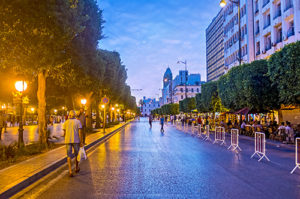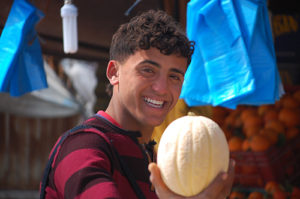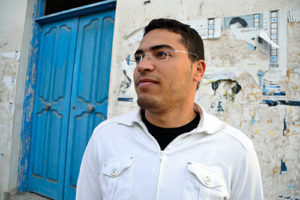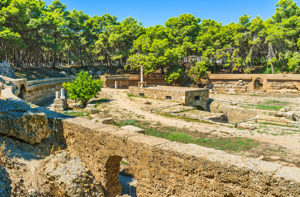In This City is a challenge to journey with us in prayer for 12 key cities in 2019. We ask you to commit to praying for fruit that will ripen and bear the seeds for mature, vibrant and multiplying churches across the Arab world. Find out more in this article from the leader of Pioneers’ Middle East Region.
Introduction
 Walking the streets of Tunis, you could be forgiven for believing you’re somewhere in Europe. There is a distinct French vibe to the architecture as well as the layout. It even has a tram system! The wide, tree-lined Avenue Habib Bourguiba has numerous cafes as well as important buildings like the Ministry of Interior and feels very Parisian!
Walking the streets of Tunis, you could be forgiven for believing you’re somewhere in Europe. There is a distinct French vibe to the architecture as well as the layout. It even has a tram system! The wide, tree-lined Avenue Habib Bourguiba has numerous cafes as well as important buildings like the Ministry of Interior and feels very Parisian!
But the history of Tunis goes back way beyond the French occupation of the late nineteenth and early twentieth centuries. It has been inhabited since at least the fourth century BC. Originally a Berber settlement, it has survived conquests and occupations and has grown to become a cultural hub for the country of Tunisia.
About Tunis
Population: 690,000 (2.7 million in greater metropolitan area)
Religion: 98 per cent Islamic, less than 2 per cent Christian, most of whom are foreigners
Geographical size: 82.1 sq miles / 212.6 sq kilometres
Location: Northern Tunisia, close to Mediterranean coast
Key historical events: One of the first towns to fall under Carthaginian rule. Sacked by the Romans in 146 BC. Briefly capital of region known as Ifriqiya (902-909 AD) encompassing eastern Algeria, Tunisia and western Libya. Made capital of Hafsid Empire in 1228. Was a French protectorate from 1881 to 1956 (under occupation 1942-43). Headquarters of Arab League between 1979 and 1990. Site of many Arab Spring protests (2010-11). Home to the Bardo Museum, where gunmen attacked and killed 20 civilians, most of them foreigners, in March 2015.
Challenges
 The people
The people
The economy in Tunisia as a whole is really struggling, not helped by the 2015 terrorist attacks in Tunis and Sousse, which had a major effect on tourism. This, in turn, makes the political situation unstable. High levels of unemployment – the catalyst of Tunisia’s Jasmine Revolution – leave young people, in particular, vulnerable to being groomed by extremist groups. Around 36 per cent of under-24s are unemployed. Their sense of self-worth is diminished and so they search for alternative ways to feel valued.
 Seekers
Seekers
Those who are seeking the truth face opposition from family and friends if their intentions are discovered. There are few safe places for seekers and believers to meet discreetly.
The team
 There seems to be plenty of seekers these days, but the challenge is finding those who will persevere in the face of hardship to grow in faith. Every faithful new believer represents 20 or more who were interested but then, for one reason or another, fell away.
There seems to be plenty of seekers these days, but the challenge is finding those who will persevere in the face of hardship to grow in faith. Every faithful new believer represents 20 or more who were interested but then, for one reason or another, fell away.
Prayer points
Pray that:
- The economic situation would improve, particularly in favour of young people. Pray that those who are vulnerable to extremism would find ways to articulate their feelings and feel appreciated in their communities.
- The political situation would stabilise. Presidential elections are due to be held towards the end of the year. Pray for the next leader of Tunisia to be wise and humble.
- Tourists would regain confidence and begin to return in higher numbers, being assured that they will be safe during their stay.
- Seekers would be able to meet with local believers safely and in places where they can talk freely.
- Seekers and new believers would be able to ‘gain their lives by endurance’ ( Luke 21:19) as they face opposition and hardships.
- Team members will be able to discern those who are truly seeking from those who are not. Pray for encouragement as they invest time and energy in people’s lives.
One last thing…
 The greater metropolitan area of Tunis includes the ancient ruins of Roman Carthage, once a large city of the Roman Empire. There you can visit the ruins of an amphitheatre where early Christians were put to death. Most famous is the young noblewoman, Perpetua, who kept a diary of her time in prison up to the time of her death.
The greater metropolitan area of Tunis includes the ancient ruins of Roman Carthage, once a large city of the Roman Empire. There you can visit the ruins of an amphitheatre where early Christians were put to death. Most famous is the young noblewoman, Perpetua, who kept a diary of her time in prison up to the time of her death.
Carthaginian author, Tertullian, wrote that ‘The blood of the martyrs is the seed of the church’ and this was certainly true. We know that many came to Christ as a result of the Romans’ persecution of early believers. However, in Tunisia today there are just a few hundred believers, all converts from Islam. How wonderful it would be to see more Tunisians return to their Christian heritage.
Thank you for praying with us
Next month we pray for Baghdad, Iraq.